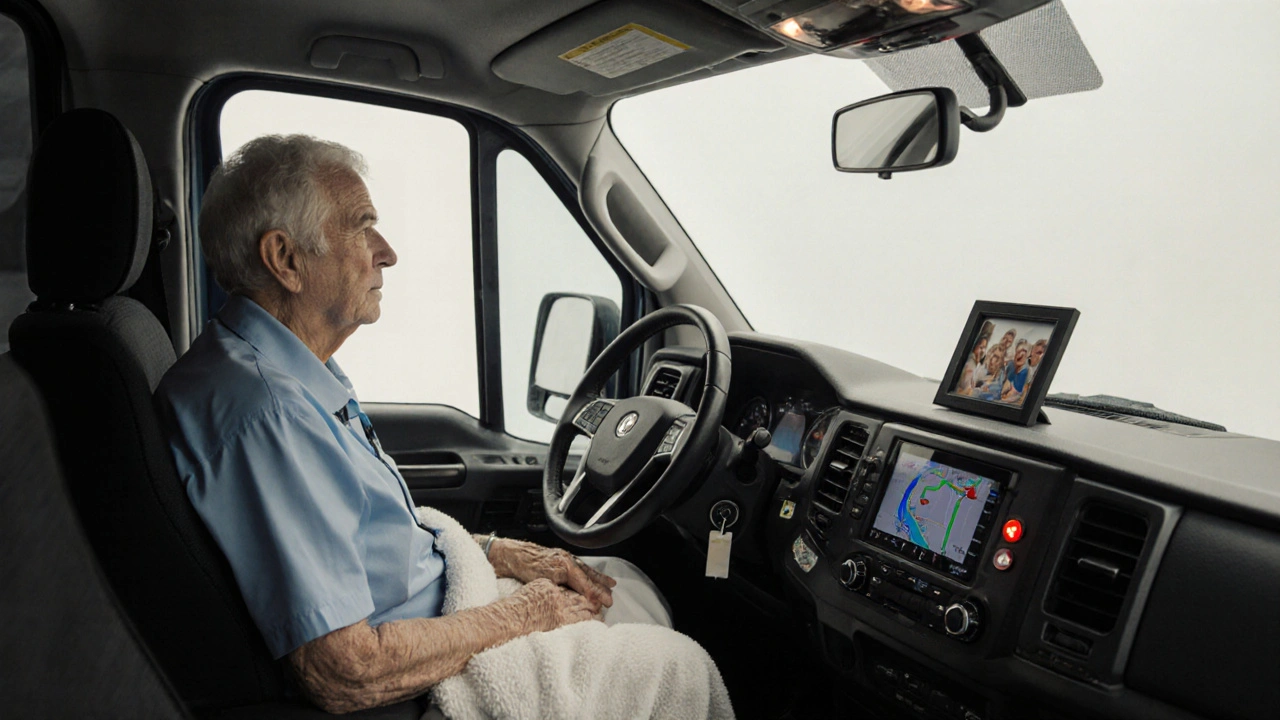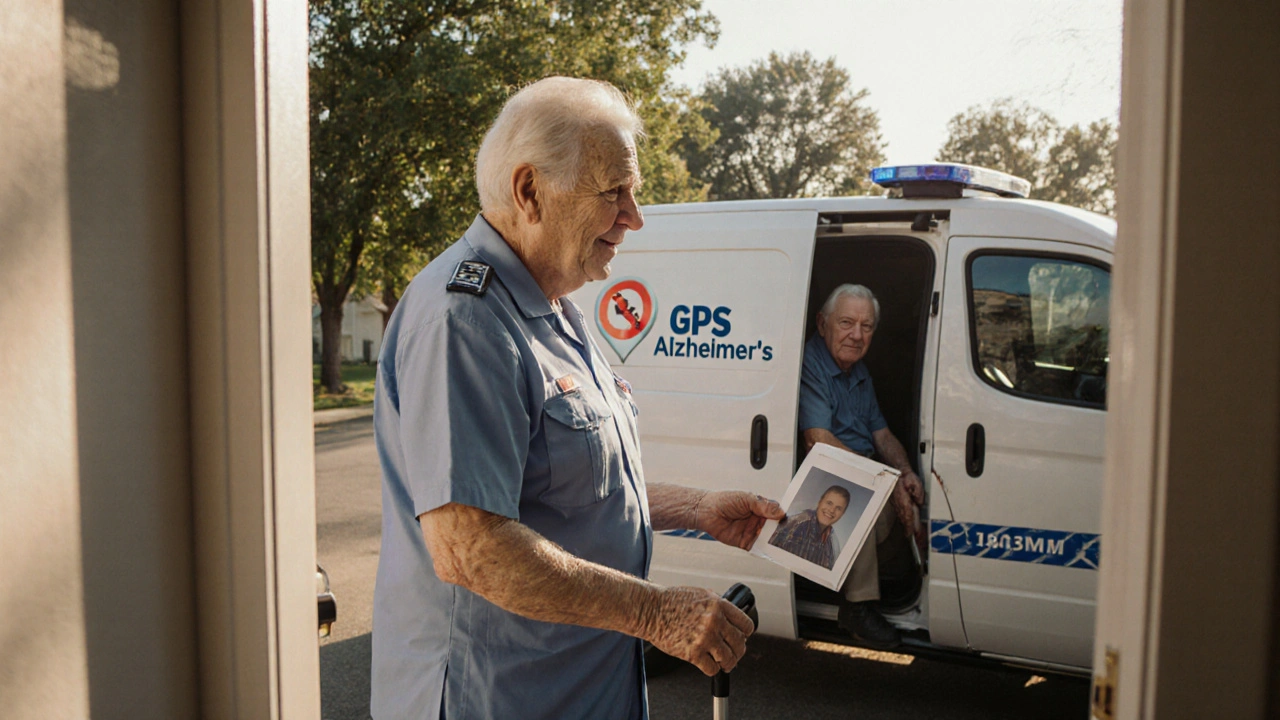When someone with Alzheimer’s needs to go to a doctor’s appointment, hospital visit, or specialist test, getting them there safely isn’t just about finding a ride-it’s about managing confusion, anxiety, and sudden behavioral changes. Many families don’t realize that a regular taxi or ride-share can put an Alzheimer’s patient at serious risk. That’s where medical escort services come in. These aren’t just drivers. They’re trained caregivers who understand how to handle wandering, agitation, and communication breakdowns-while keeping the person calm and secure.
Why Regular Transport Doesn’t Work for Alzheimer’s Patients
Imagine being disoriented, not remembering where you are, or thinking you’re supposed to get off at the wrong stop. That’s the daily reality for many with moderate to advanced Alzheimer’s. A standard driver doesn’t know how to respond when a patient tries to open the door while the car is moving, or starts shouting because they think they’re being taken somewhere they don’t want to go. There’s no training in de-escalation, no understanding of non-verbal cues, and no backup plan if the patient becomes aggressive or freezes up.
Studies from the Alzheimer’s Association show that over 60% of dementia-related emergency room visits during transport are due to preventable incidents-like falls, panic-induced combative behavior, or getting lost during transit. Medical escort services reduce those risks by design. Their vehicles are equipped with seatbelts, door locks, and GPS trackers. Drivers are certified in dementia care, not just driving.
What to Look for in a Medical Escort Service
Not all services are the same. Some are just private car companies with a “medical” label slapped on. Here’s what actually matters:
- Staff training: Are drivers certified in dementia care? Look for training from recognized programs like the Alzheimer’s Society (UK), Dementia Training Australia, or the National Institute on Aging’s caregiver curriculum.
- Vehicle safety features: Seatbelts, locked doors, emergency buttons, and climate control are non-negotiable. Some services even use padded interiors to prevent injury during sudden movements.
- One-on-one care: Avoid services that pack multiple patients into one vehicle. Alzheimer’s patients need individual attention. A driver should be dedicated to one person per trip.
- Communication protocols: Do they ask for a care plan? Can they speak with family or caregivers before the trip? Good services will request a brief profile: favorite phrases, triggers, routines, and how the person responds to stress.
- Background checks and insurance: Always ask for proof of police clearance and liability coverage. If they hesitate, walk away.
In Perth, services like Dementia Transport WA and SafeRide Medical Escorts have been vetted by local aged care agencies. They don’t just drive-they monitor vitals, offer reassurance, and know how to redirect someone who’s fixated on going home.
How to Book a Medical Escort Service (Step by Step)
Booking shouldn’t be a last-minute scramble. Start early. Here’s how to do it right:
- Call your doctor’s office. Ask if they have a preferred medical escort provider. Many clinics partner with local services and can give you a referral.
- Check with your local aged care provider. If you’re receiving government-funded home care (like Home Care Packages in Australia), they often have contracts with transport services and can arrange it at little to no extra cost.
- Search for accredited providers. Use the Dementia Australia directory or the National Disability Insurance Scheme (NDIS) provider list. Look for services with a “Dementia Friendly” badge.
- Ask for a trial run. Request a short, non-medical trip first-like a visit to a park or café. Watch how the driver interacts. Do they make eye contact? Do they use simple language? Do they seem patient?
- Provide a written care summary. Include: preferred name, daily routine, common triggers (loud noises, bright lights), favorite music or phrases, and what calms them down. Give this to the driver before each trip.
Don’t assume the driver will figure it out. Most won’t. The more detail you give, the less likely something will go wrong.

What Happens During the Trip? What to Expect
A good medical escort service doesn’t just show up and drive. They prepare. Before the patient even gets in the car:
- The driver will greet them by name and introduce themselves calmly.
- They’ll use a consistent routine-same vehicle, same route, same time of day.
- They’ll avoid sudden movements or loud music.
- They’ll carry a small comfort item: a familiar blanket, a photo, or a favorite snack.
During the trip, expect the patient to repeat questions, forget where they’re going, or suddenly refuse to move. That’s normal. A trained escort won’t argue. They’ll repeat the destination in simple terms: “We’re going to the clinic to see Dr. Lee. You like Dr. Lee, right?” Then they’ll shift focus: “Look at that bird outside the window.” Redirecting works better than correcting.
At the destination, the escort doesn’t just drop them off. They walk the patient to the reception desk, confirm the appointment, and stay until the staff takes over. They’ll also note any behavioral changes and report them back to the family.
Costs and Funding Options in Australia
Medical escort services in Australia typically cost between $50 and $120 per trip, depending on distance and duration. That’s more than a taxi-but it’s not just transport. It’s care.
Here’s how to reduce the cost:
- NDIS funding: If the patient is NDIS-eligible, transport can be covered under “Core Supports” or “Improved Daily Living.” You’ll need a plan review to add it.
- Home Care Package: Level 2 and above often include transport as part of the budget. Talk to your care coordinator.
- State government programs: In Western Australia, the Department of Communities offers subsidized transport for seniors with cognitive impairments. Call 1800 611 922 for details.
- Medicare: Doesn’t cover transport-but some private health insurers offer it as an optional add-on. Check your policy.
Don’t assume it’s unaffordable. Many families qualify for help and don’t ask.
Red Flags to Avoid
Some services look good on paper but fail in practice. Watch out for:
- Drivers who don’t ask for a care plan or refuse to speak with family members.
- Services that use unmarked cars or don’t have a visible company name or logo.
- Staff who correct the patient’s confusion (“No, you’re not at home, you’re in the car”) instead of validating their feelings.
- No emergency protocol listed on their website. What happens if the patient has a seizure or becomes violent?
- Only accepting cash payments with no receipt or invoice.
If something feels off, trust your gut. Your loved one’s safety is worth the extra time to find the right provider.

Preparing Your Loved One for the Trip
Even the best escort can’t fix a poorly prepared trip. Here’s how to make it smoother:
- Time it right. Schedule trips during their best time of day-usually morning for most Alzheimer’s patients.
- Dress them in familiar clothes. Avoid buttons, belts, or tight collars that can cause frustration.
- Bring a small bag with: water, a snack, a photo of family, a favorite item (like a stuffed animal or scarf), and a copy of their medication list.
- Don’t overstimulate. Avoid crowded waiting rooms. Ask the escort to wait in the car if possible.
- Give them a heads-up. Say, “We’re going to see the doctor tomorrow at 10,” not “We’re going out.” Too much detail can overwhelm.
Consistency is everything. Use the same escort, same route, same routine. It builds trust and reduces anxiety.
What Comes After the Appointment?
The trip doesn’t end when you get home. Debrief with the escort. Ask:
- How did they behave during the ride?
- Did they seem more confused or agitated than usual?
- Did they respond to any specific words or actions?
Use that feedback to adjust future trips. Maybe they need music playing. Maybe they need a break halfway. Maybe the appointment time is too late.
Also, update your care plan. If the escort noticed new symptoms-like sudden memory loss or uncharacteristic aggression-tell the doctor. These observations can be critical for adjusting treatment.
Can I use a regular taxi for an Alzheimer’s patient?
It’s not recommended. Regular drivers aren’t trained to handle confusion, wandering, or sudden agitation. Many Alzheimer’s patients have tried taxis and ended up lost, scared, or injured. Medical escort services are specifically designed for cognitive impairments-with trained staff, locked vehicles, and emergency protocols. The extra cost is worth the safety.
Is medical escort covered by Medicare?
No, Medicare doesn’t cover non-emergency medical transport. But if your loved one is eligible for the NDIS or a Home Care Package, transport can often be funded under those programs. Check with your care coordinator or call the Department of Communities in Western Australia for subsidized options.
How do I know if a service is trustworthy?
Ask for proof of dementia care certification, police checks, and insurance. Look for services listed by Dementia Australia or NDIS. Call them and ask to speak with a manager-not just a dispatcher. If they can’t answer detailed questions about their training or safety procedures, keep looking.
What if my loved one refuses to get in the car?
Don’t force them. A trained escort will use redirection: “Let’s go see the garden first,” or “I have your favorite tea in the car.” They might wait 10-15 minutes, play calming music, or bring a familiar object. If the patient is highly distressed, reschedule. Pushing can create lasting fear of transport.
Can I ride along with the escort?
Yes, most services allow a family member to ride along at no extra cost. In fact, it’s often encouraged for the first few trips. But after that, it’s better to let the escort build trust alone. Your presence can sometimes increase anxiety if the patient thinks you’re leaving them.
Final Thoughts: Safety Is a Routine, Not a One-Time Fix
Booking a medical escort isn’t a one-off decision. It’s part of a long-term care strategy. The more you standardize the process-the same driver, same route, same time, same comfort items-the less stress your loved one will feel. And the less stress they feel, the safer they are.
Alzheimer’s doesn’t just affect memory. It changes how someone experiences the world. A medical escort doesn’t just move a person from point A to point B. They help them feel seen, heard, and safe in a world that’s becoming harder to understand. That’s not a luxury. It’s a necessity.
